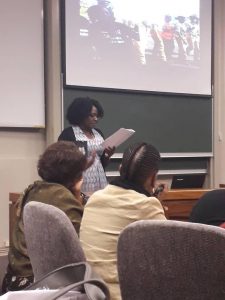
In April 2018, they presented at the “Thetha Sizwe” conference (University of Pretoria), where the theme was “Intersections, Practices, and Identities – Rethinking Gender in African Languages and Literature”. The event brought together academics, researchers and postgraduate students from different parts of Africa, and the engaging and thought-provoking conversations among participants illustrated fluid and diverse ideas about gender in many African contexts but, at the same time, how forms of patriarchy can use gender as a category to conserve rigid structures of inequality. Dr Mtenje’s paper focused on the possibilities and limitations of language during protests against gender-based violence in Malawi. The protests sought, partly via forms of language, to challenge normative discourses that shape women’s sexualities, and to demonstrate women’s material and discursive agency. Dr Okolo’s paper, “Fiction as Valuable Potential: The De/re-valuing of Queer Lives”, speculated that the insistent depiction of queer experience through the lens of the victim, the marginal, and the violated, even in queer advocacy short story anthologies such as the 2013 and 2017 Queer Africa volumes, might unwittingly further the stigma which heteronormativity attributes to queerness, hindering the possibility of affirmative, restorative, agency.
Venturing further abroad…
Also in April, Dr Okolo was in Germany, a guest of the Bayreuth International Graduate School of African Studies (BIGSAS). She gave an invited presentation in the ‘Gender and Diversity Public Lecture’ series, drawing on her experience as a female scholar in Nigeria. She addressed sexuality as depicted in examples of African literature, and how this area of study is presented and received in educational contexts. Sexuality remains a taboo subject in Nigerian literary studies, and even though creative writers are increasingly addressing questions of sexuality, there is a relatively slow response from literary critics. Her lecture also considered how public discourses on ‘sex’ prefer to accommodate only those elements of sexuality that are considered ‘serious’ – reproductive health, STDs, and sexual violence, for example, rather than the complexities of sexual desire in relation to gender and orientation.
Dr Mtenje’s current intellectual journey has taken her to Ghana, where she recently arrived safely in Accra for the residency component of her African Humanities Fellowship. She’s enjoyed more than a warm welcome, since it’s brutally hot – and apparently gets much hotter. She will make happy weather of the coming weeks, spending two months researching and writing up material for her next paper on sexualities in contemporary fiction.
Any other news from postdocs – keep us posted!
